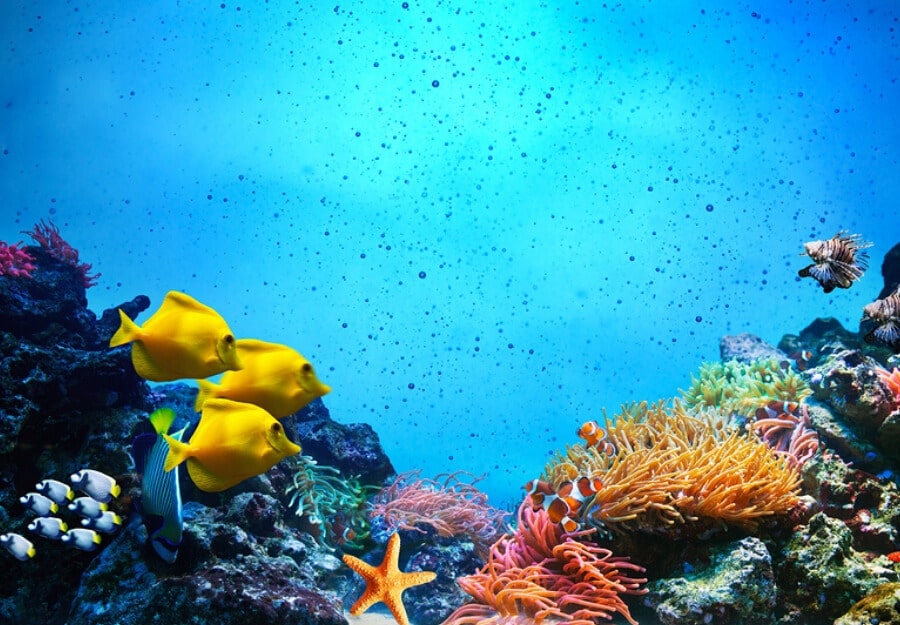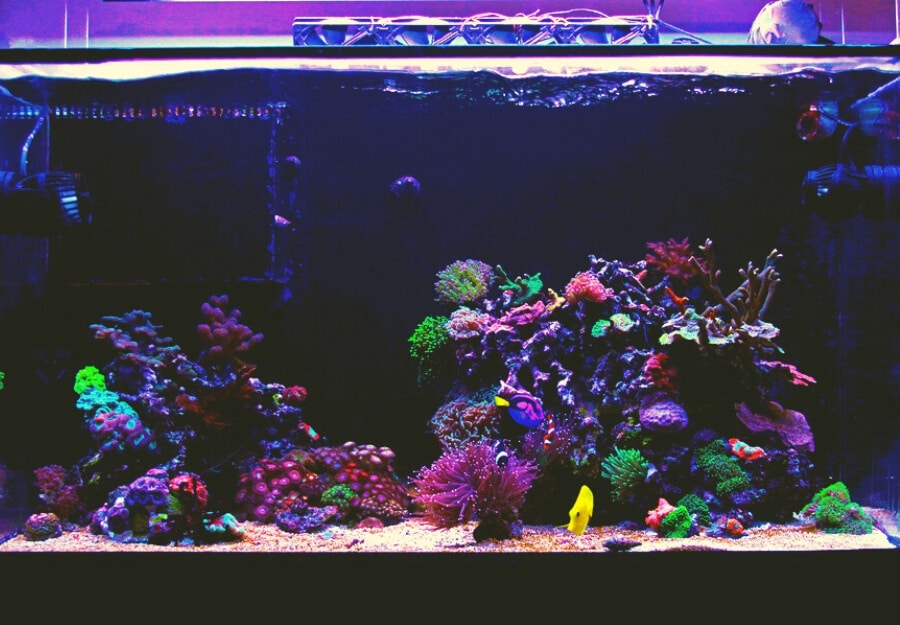The quality of water in a fish tank is critical to ensure the health of the fish. This routine upkeep is important to keep a balanced fish tank. That’s why Crystal Oceans goes all the way out into the ocean to get its salt water.
If everything is running properly and your fish are healthy, there is no need for any major change, even if the pH or hardness is slightly out of range. Only increases or decreases of any major water parameters will require careful but immediate attention.

How Often Should You Change the Water in Your Fish Tank?
The most important part of saltwater fish tank maintenance is to keep water change as a regular routine. On average, changing the water of the aquarium should be every two weeks. It is recommended to use a siphon to vacuum the gravel and at the same time, be able to extract water. This will help remove toxic waste products such as fish excrement and uneaten food particles inside the fish tank.
It is recommended to test the water parameters of both the replacement water and the normal seawater. Check the trends. You can use tap water which has a combination of chloramine and chlorine. This is also rich in iron, phosphates, and other heavy metals. You can use a water conditioner to diffuse the chlorine. Ammonia remains in the water which will only be neutralized when placed inside the fish tank with the presence of nitrifying bacteria.
Saltwater fish tanks require periodic upkeep and cleaning to ensure the proper functioning and avoid unnecessary costs. The maintenance schedule would largely depend on your system type. These filter systems require different maintenance schedules.
Daily Maintenance
- Feeding the fish should be done twice a day.
- Inspect livestock every day. Check on your fish to make sure that each one is accounted for and alive. Assess health conditions and injury.
- Check on the gravity and temperature levels to ensure that everything is within safe parameters. Make the necessary adjustments when necessary.
- Do a thorough inspection of the lighting, heating, protein-skimming, and filtration equipment to ensure that everything is running smoothly. Check for any leaks and ensure that all tubes are properly connected.
- If you are maintaining other saltwater animals, then you must include buffering agents and calcium into the water. This would be unnecessary if you are exclusively handling fish.

Weekly Maintenance
- Check the stability of your water compounds such as nitrate, phosphate, nitrite, and ammonia levels to ensure that everything is stable. Check on alkaline and calcium levels too.
- Clean the fish tank glass panes using an algae magnet. This will help get rid of accumulated debris and maintain the quality of saltwater.
Monthly Maintenance
- Clean the cover glasses, lighting, and acrylic shield of your fish tank. This helps declutter your fish tank and remove calcium and salt deposits that can contaminate marine life.
- Soak the air intakes valves and hose on white vinegar solution to prevent clogging of calcium deposits. Brush the valves and hose after soaking to remove excess debris.
- This is the time to conduct major or large water changes. This is necessary if there is a presence of heavy bioload or if pollutants are increasing and disrupting water chemistry and quality.
- It is advisable to replace the mechanical filtration media tank after a few days that you have done a major water change. This is necessary to avoid nitrite and ammonia spikes.
Checklist for Regular Saltwater Fish Tank Maintenance
Checking your fish tank every day and recording observations of livestock or marine life in your logbook will keep you in the loop of the current condition of your fish and changes in water quality conditions. This will also keep you organized and help you stay on top of your monitoring schedule.
Check on the fish’s appetite, activity, eye condition, color, and fins. Check for the water quality and circulation.
Check to ensure that the following are within safe parameters:
- Ammonia
- Salinity
- Alkalinity
- pH
- Iodine
- Nitrite
- Calcium
- Nitrite
- Phosphate
When conducting major cleaning of your fish tank, take time to inspect your entire system. Be very meticulous and check every inch of your fish tank. Don’t leave any stone unturned. Protect your floor from water damage when cleaning by putting old towels underneath and in front of the tank. Start from the insides of the fish tank and all throughout the system.
When Is It Time to Clean Your Fish Tank?
There are telltale signs that give you a hint that your fish tank needs some cleaning. Your mechanical filter can tell you that it’s high time to clean up. Check the amount of water that comes out from the filter outflow. If you observe that the water flow has become slower in comparison to the last time that the filter was cleaned then it’s time for a cleaning or maintenance schedule.
Why Do You Need to Clean Your Fish Tank?
You should look at your fish tank’s filter as a garbage can that needs to be emptied when full to maintain the integrity of the water and avoid fish contamination.
Get Rid of Dissolved Organic Compounds in the Water.
Carbon, hydrogen, sugars, and other amino acids are considered as organic compounds. These are by-products of food waste. Having plants in the fish tank can help eliminate these organic matters while the rest can be controlled or dissipated from the regular cleaning and water changes.
Keep Low Levels of Nitrate Concentration.
Ammonia in water is converted by nitric bacteria to nitrite and nitrate. These are regarded as toxins to fish. Bacteria colonies in the fish tank is important to convert these harmful toxins into nitrate which is less toxic and can be removed with a consistent water change.
Prevent Osmotic Stress and Death.
With insufficient minerals in the fish tank water, fishes and other marine life may experience osmotic stress and can lead to death. This happens when you use RO water which has been treated or has gone through a reverse osmosis process that eradicates tap water toxins but also depletes essential minerals that marine life needs to survive.
Regular aquarium maintenance is important in South Florida to ensure its optimal conditions that will keep marine life healthy and sustainable. Routine upkeep and cleaning help preserve and sustain the eco-system in your fish tank. Every fish tank is different and has unique conditions to consider in its regular maintenance process.
You can set your own schedule or timeline but keep your eye on the goal. It’s a commitment and responsibility to conduct saltwater fish tank maintenance. It’s not easy but with time management, patience, and focus, you will sync into the right schedule. Consistency is the key to get this done.